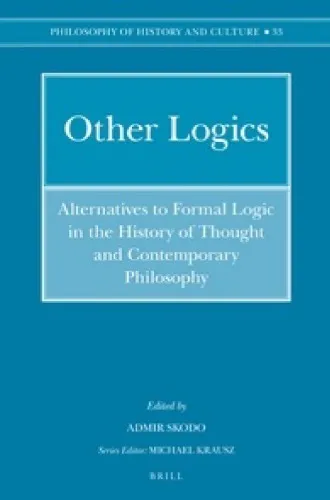Other Logics: Alternatives to Formal Logic in the History of Thought and Contemporary Philosophy
4.3
بر اساس نظر کاربران

شما میتونید سوالاتتون در باره کتاب رو از هوش مصنوعیش بعد از ورود بپرسید
هر دانلود یا پرسش از هوش مصنوعی 2 امتیاز لازم دارد، برای بدست آوردن امتیاز رایگان، به صفحه ی راهنمای امتیازات سر بزنید و یک سری کار ارزشمند انجام بدینمعرفی کتاب
کتاب "Other Logics: Alternatives to Formal Logic in the History of Thought and Contemporary Philosophy" به قلم ادیر اسکودو، نگرشی نوین و جامع به تاریخ و نظریه منطق ارائه میدهد. این کتاب به بحث دربارهٔ جایگزینهای logic formal پرداخته و تحلیلی عمیق از منطقهای دیگر در تاریخ اندیشه و فلسفه معاصر ارائه میکند.
خلاصه جامع کتاب
این کتاب با هدف بررسی و بازنگری در تاریخ منطق، میکوشد تا حوزههایی فراتر از logic formal را کشف کند. با دیدی وسیع به جایگزینهای منطق سنتی، مؤلف تاریخ تحولاتی را بررسی میکند که در آن دیگر نظامهای منطقی رشد و توسعه یافتهاند. از منطقهای انتقادی و دیالکتیکی گرفته تا سیستمهای بدیلی که در فرهنگها و فلسفههای غیرغربی شکل گرفتهاند، این کتاب سعی دارد به خوانندگان ابزاری جدید برای درک تفکر منطقی ارائه دهد.
نکات کلیدی
- ارائه دیدگاههایی جدید و چالشبرانگیز دربارهٔ مفهوم منطق.
- بررسی منطقهایی که در برابر قالبهای rigid و محدود کنندهٔ logic formal قرار میگیرند.
- تحلیل تاریخ ارائه منطق در فرهنگها و تمدنهای مختلف.
- شناسایی نقش منطقهای جایگزین در ارتقاء تفکر خلاقانه و نوآورانه.
جملات معروف از کتاب
"در جهان فکری که به واسطهٔ سیستمهای rigid منطقی محدود شده است، گشودن دریچهای به سوی اشکال دیگر منطق میتواند نویدبخش آزادی فکری باشد."
"هر فرهنگی منطق خاص خود را دارد؛ برای فهم بهتر جهان نیاز است که به خارج از چهارچوبهای متداول منطقی فراتر رویم."
چرا این کتاب اهمیت دارد
این کتاب اهمیت ویژهای در ارائه یک رهیافت نوین به مباحث منطق دارد. در حالی که logic formal همواره به عنوان پایه و اساس تفکر منطقی در نظر گرفته شده است، این کتاب ابعاد دیگری از منطق را بازنموده و بر آن است که جایگزینهای ممکن و سازندهٔ آن را بررسی کند. خوانش این کتاب میتواند به پژوهشگران، دانشجویان فلسفه و همچنین به علاقهمندان به توسعه روشهای تفکر کمک نماید تا مرزهای شناخت خود را وسعت بخشند و به درک بهتری از عالم دست یابند.
Introduction to 'Other Logics: Alternatives to Formal Logic in the History of Thought and Contemporary Philosophy'
Welcome to an intellectual exploration that transcends the boundaries of conventional reasoning. 'Other Logics: Alternatives to Formal Logic in the History of Thought and Contemporary Philosophy' invites readers to embark on a philosophical journey, examining the rich landscape of logical thought beyond traditional formal logic. This book offers an in-depth discourse on the multiplicity of logical systems, their historical development, and their relevance in today's philosophical and practical contexts.
Detailed Summary
At the core of 'Other Logics' is an investigation into the diverse methodologies and frameworks that have existed alongside, and often in opposition to, formal logic. The text provides a comprehensive historical account, starting from ancient philosophical traditions and moving through the Middle Ages and into today's postmodern theories. By exploring thinkers such as the Sophists, Indian Nyāya scholars, medieval Islamic philosophers, and contemporary existentialists, the book articulates the various forms of logic that have shaped human understanding and reasoning practices.
Each chapter addresses distinct logical paradigms, such as informal logic, dialectical reasoning, and paraconsistent logics. The discussions are enriched with examples and cases where these alternative logics offer substantial theoretical and practical benefits. This book serves as a valuable resource for students and scholars interested in philosophy, logic, and cognitive sciences, fostering an appreciation for the multiplicity of logical traditions.
Key Takeaways
- Historical Context: Understand how alternative logic systems have existed across different epochs and cultures, influencing philosophical discourse and scientific thought.
- Diversity in Logic: Gain insight into various logical systems like informal logic, paraconsistent logic, and many-valued logic, which challenge conventional binary truth values.
- Relevance Today: Explore how these alternative logics provide robust frameworks for contemporary debates in artificial intelligence, ethics, and cognitive sciences.
- Interdisciplinary Connections: Discover the links between logical theories and other fields, including linguistics, psychology, and computational theory.
Famous Quotes from the Book
"The history of logic is not a single pathway of progress, but a vibrant tapestry of diverse thought systems, each weaving its own method of understanding the world."
"By embracing alternative logics, we open the door to a plurality of viewpoints, each offering unique insights into the human condition and our pursuit of knowledge."
Why This Book Matters
'Other Logics' stands as a pivotal text in a world increasingly dominated by algorithmic thinking and digital logic. It reminds us of the importance of broadening our intellectual horizons by engaging with different frameworks of reasoning. By highlighting lesser-known logical traditions, the book challenges the homogenizing forces of modern logical doctrines and fosters a more inclusive and comprehensive understanding of logic's role in human thought.
The diverse array of logical systems discussed resonates with current dialogues about cultural diversity, pluralism, and interdisciplinarity. It encourages readers to question the assumed superiority of formal logic and recognize the value of alternative methods in solving complex, real-world problems. This perspective is particularly vital for addressing ethical considerations in technology and scientific advancements, where traditional logic may fall short.
In conclusion, 'Other Logics' is not merely a book about logic; it is a call to appreciate the richness and variety of human thought. It urges us to challenge conventional perspectives and embrace a broader spectrum of intellectual possibilities, ultimately contributing to a more nuanced and holistic understanding of the world in which we live.
دانلود رایگان مستقیم
برای دانلود رایگان این کتاب و هزاران کتاب دیگه همین حالا عضو بشین
برای خواندن این کتاب باید نرم افزار PDF Reader را دانلود کنید Foxit Reader


